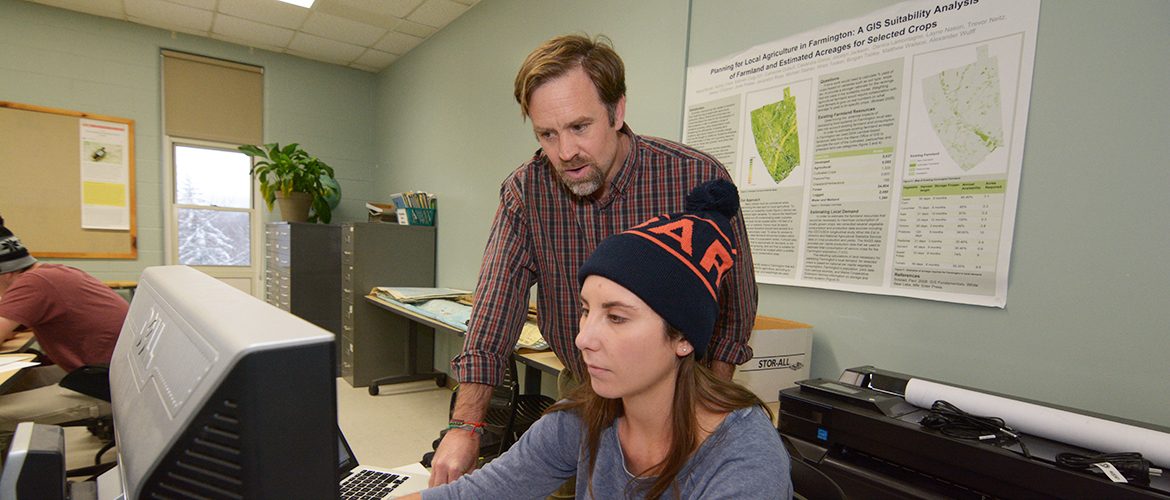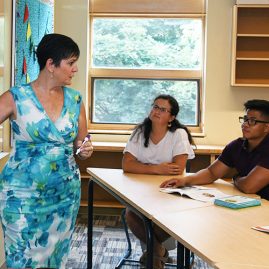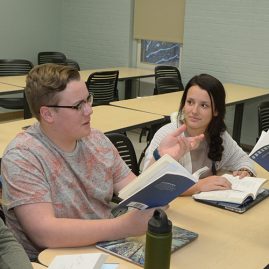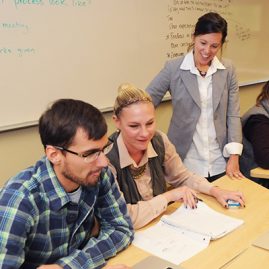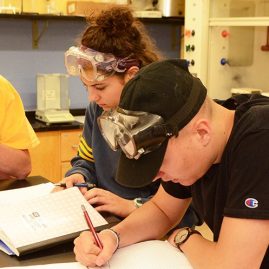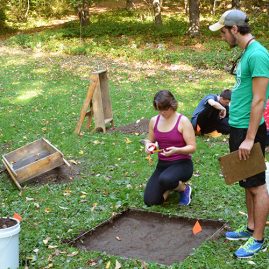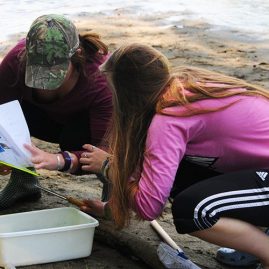The University of Maine at Farmington Geography and Environmental Planning program is designed to help you discover your own interests within the field of geography and environmental planning.
Geographers and environmental professionals solve complex social and environmental problems. They use critical thinking, analytical tools, and advanced technologies to understand human-environment interactions, place and culture, and spatial relationships.
The ability to think creatively and critically gives you a strong skill set essential for fast-growing careers in areas like:
- Environmental Justice and Advocacy
- Environmental Health
- Environmental Regulation and Enforcement
- Recreation
- Community Planning
- International Development
- Mapping and Geospatial Technologies
- Many other fields
Here, you’ll pursue personal and professional interests by choosing your own path in Geography or Environmental Policy and Planning.
In each path, you’ll develop expertise in one of several possible concentrations:
Geography Path
- Peoples and Environments concentration
- Communities and Development concentration
- Nature and Society concentration
Environmental Policy and Planning Path
- Development & Economics
- Policy concentration
- Ecology concentration
- Environmental Health concentration
- Geosciences concentration
Or you can design your own concentration — developing a tailored-just-for-you concentration that fits your personal interests and career goals.
Save more than $5,500 per year in tuition. This University of Maine at Farmington program qualifies for the NEBHE Tuition Break.
Through the NEBHE Tuition Break program, students from Connecticut, Massachusetts, New Hampshire, Rhode Island, and Vermont receive a $5,670 tuition discount on all UMF degree programs.
What can you do with a degree in Geography & Environmental Planning?
Data comes from the U.S. Bureau of Labor Statistics and other sources. Median Salaries for positions in Maine typically fall below those of other New England states.
Internship & Research Opportunities
At UMF you can find out, first-hand, what it’s like to work in the Geography and Environmental Planning field while you learn valuable career skills and develop a strong network of professional contacts.
Here’s a short list of where our students have recently interned:
- Portland Water District
- Inland Woods and Trails, Bethel
- Town of Union, Maine
- 7 Lakes Alliance, Belgrade Lakes
- KrugerSEA – Anacortes, WA
- Maine Oyster Company, Phippsburg
- And more
See Geography & Environmental Planning student intern Alicia Gaiero (included in this three-student video) on why she chose Farmington

Student Researcher Eve Fischer
Eve Fischer, a University of Maine at Farmington student from Portland and a Maine Policy Scholar, recently presented her research study on the resurgence of the invasive European green crab in the Gulf of Maine to the Maine State Legislature.
In her presentation to the Maine State Legislature Marine Resources Committee, she discussed the importance of the Gulf of Maine, how it has supported a long tradition in the seafood industry, the negative impact the invasive green crab is having, and some potential policy solutions Maine could use to control
Her research included findings from her summer internship with Manomet, a non-profit organization that works across North and South America to create a more sustainable world. During that study, she examined the complex issue of invasive species, the serious threat it poses to Maine’s valuable marine industries and species, and policies elsewhere that have been developed to manage them.
Fischer learned the crabs could be processed for lump crab meat and soft-shell crabs, which could provide a valuable resource to Maine restaurants. She shared with legislators that the culinary market has the greatest potential value and may be a significant future market for the invasive green crab problem.
“Eve’s work on green crabs is a perfect example of how UMF supports professional development in multiple ways,” said UMF Assistant Professor of Geography and Environmental Planning Jesse Minor. “Her summer internship, the Maine Policy Scholarship, serving as a teaching assistant for my Honors First-Year Fusion class, and a semester-long independent study all combined to support her investigations into a real-world environmental problem that is causing real harm to Maine’s marine ecosystems.”
- See more in UMF in the News
Other recent student internship and research projects:
- A mapping and sustainability project at an oyster aquaculture farm in Phippsburg, Maine
- A video documentary of the Farmington street art scene
- A photo collage illustrating a student’s investigation of a public art project in Detroit
- A photographic documentary of skiing at Tuckerman Ravine, Mt. Washington
- An inventory of sustainability practices in Rangeley, Maine, resulting in a web map and interactive mobile app
- A study of Mayan women’s access to birth control in the Guatemalan highlands
- An analysis of a community gardening project at a middle school in Belfast, Maine.
Our graduates have worked as environmental educators, cartographers and GIS managers, business analysts, field technicians and managers at environmental consulting firms, planners and program directors for nonprofits and government agencies, Maine guides and tourism operators and in a variety of other careers.
UMF Named a 2024 “Top Green College” by Princeton Review Guide to Green Colleges: 2024 Edition
The Princeton Review Guide to Green Colleges: 2024 Edition provides a comprehensive measure of a school’s performance as an environmentally aware and prepared institution.
According to the Princeton Review, the schools that were selected for the Guide to Green Colleges all have exceptional programs, policies, and practices related to sustainability and the environment. The 2024 Guide features profiles of 522 schools
Environmental sustainability is woven into the fabric of Farmington, a leader in the region and an early adopter of energy-saving practices including recycling, renewable energy, and academic programs in Earth & Environmental Science and Geography & Environmental Planning. We are proud to be recognized by the Princeton Review for our dedication to an environmentally sustainable future.
UMF’s formal commitment to environmental sustainability began with the creation of the UMF Sustainable Campus Coalition in 2001. Its Green Vision Statement in 2006 provided the foundation for sustainable practices to be an integral part of campus management leading to the construction of several LEED-certified campus buildings, the signing of the American Colleges and Universities Presidents’ Climate Commitment, and recognition by the U.S. House of Representatives for UMF’s efforts in making a clean energy campus a reality.
In 2016, UMF completed a biomass heating plant that burns locally sourced wood chips to heat close to 85% of the campus with renewable biomass. The UMF heating plant is projected to recoup construction costs through energy savings in the first 10 years of operation and is reducing the University’s carbon emissions by 4,000 tons per year.
A second biomass boiler was added to the UMF Biomass Plant in the summer of 2023 to heat campus hot water during the warmer months in late spring, summer and early fall. Both units will continue to use locally sourced Maine wood chips in place of fossil fuel and in support of the local economy.
According to The Princeton Review, out of the over 710 schools considered for this project, all 455 Green Colleges (which includes the University of Maine at Farmington) profiled on its site are, in their opinion, truly up to the task of training the next generation of leaders, people who will be responsible for putting green ideas into practice.
Contact Us
Office of Admissions
University of Maine at Farmington
246 Main Street
Farmington, Maine USA 04938-1994
tel 207-778-7050
fax 207-778-8182
TYY (via Maine Relay Service) dial 711
umfadmit@maine.edu


